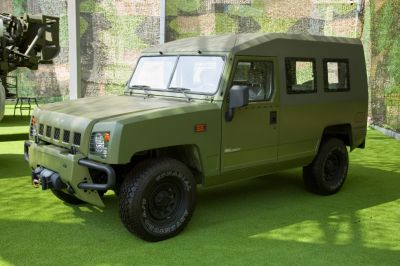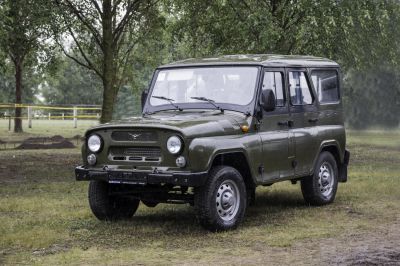 1988 Daihatsu Rocky Soft Top (F7,F8) Dimensions, Size & Specs
1988 Daihatsu Rocky Soft Top (F7,F8) Dimensions, Size & Specs
Measurements of the 1988 Daihatsu Rocky Soft Top, engineered for optimal performance and comfort
| Dimensions | |
|---|---|
| Length: | 3840-4165 mm151.2-164.0 in12.6-13.7 ft |
| Width: | 1690-1780 mm66.5-70.1 in5.5-5.8 ft |
| Height: | 1850-1930 mm72.8-76.0 in6.1-6.3 ft |
| Trunk Capacity: | 520-750 liter18.4-26.5 cu ft |
| Trunk Capacity (Max): | 1500 liter53.0 cu ft |
| Weight Specifications | |
| Curb Weight: | 1470-1725 kg3241-3803 lbs |
| Maximal permitted Weight: | 2200-2510 kg4850-5534 lbs |
| Tire Specifications | |
| Tire Sizes: |
|
The Daihatsu Rocky Soft Top (F7, F8), produced from 1987 to 1998, is a notable off-road vehicle known for its compact yet robust design tailored for rugged terrain. Measuring between 3840 mm and 4165 mm (approximately 12.6 to 13.7 feet) in length, this SUV offers a versatile size suitable for both city driving and off-road challenges. The vehicle's width ranges from 1690 mm to 1780 mm (about 5.5 to 5.8 feet), and it stands tall with a height between 1850 mm and 1930 mm (6.1 to 6.3 feet), providing ample headroom and a commanding driving position. Weighing in at a curb weight of 1470 to 1725 kilograms (3240 to 3804 pounds), the Rocky Soft Top balances durability with manageable weight to enhance performance and fuel efficiency. The maximum weight capacity falls between 2200 kg and 2510 kg (4850 to 5535 pounds), enabling it to handle cargo and passengers effectively. Luggage space is generous for its class, offering between 520 and 750 liters (18.3 to 26.5 cubic feet) with rear seats in place, and expanding to a substantial 1500 liters (53 cubic feet) when the rear seats are folded down, making it practical for long trips or transporting bulky items. Tire options include 215/85 R15 and 255/70 R15 sizes, providing robust traction and stability on diverse surfaces. Overall, the Daihatsu Rocky Soft Top stands out as a compact, adaptable off-road vehicle that combines practical interior space with rugged off-road capability, ideal for outdoor enthusiasts and daily use alike.
Discover the standout features that make the 1988 Daihatsu Rocky Soft Top a leader in its class
Have a question? Please check our knowledgebase first.
The Daihatsu Rocky Soft Top generation, produced from 1987 to 1998, features a length that varies between 3840 mm and 4165 mm (approximately 151.2 inches to 163.9 inches). This range in length is due to different sub-models and optional equipment, providing versatility depending on specific needs for space or compactness in urban or off-road environments. The shorter lengths suit maneuverability better, while the longer configurations offer more cabin or cargo space.
The width of the Daihatsu Rocky Soft Top ranges from 1690 mm to 1780 mm (about 66.5 inches to 70.1 inches). This moderately narrow width is typical of compact off-road vehicles, allowing easier navigation through tight trails or urban streets while maintaining enough width to provide stability and interior space. The variation in width depends on trim levels and tire sizes, with wider tires increasing overall track width slightly.
Standing between 1850 mm and 1930 mm tall (72.8 inches to 76 inches), the Daihatsu Rocky Soft Top has a relatively high profile. This elevated height enhances ground clearance, beneficial for off-road driving by allowing the vehicle to clear obstacles like rocks and uneven terrain more easily. However, its tall stance requires cautious driving to prevent rollover risks, especially during sharp turns or steep grades.
The Daihatsu Rocky Soft Top weighs between 1470 kg and 1725 kg (3241 to 3802 lbs) when unloaded. This weight range indicates a solid build appropriate for off-road durability while balancing the vehicle's agility and acceleration. Being relatively lightweight for an off-roader aids in fuel efficiency and handling but still allows the vehicle to maintain stability and traction on challenging terrains.
Standard residential garages typically measure around 2440 mm (8 feet) wide, 4880 mm (16 feet) deep, and 2130 mm (7 feet) tall. Given the Daihatsu Rocky Soft Top's width of up to 1780 mm (70.1 inches) and height up to 1930 mm (76 inches), it comfortably fits within the width and height limits of a common garage. Its length varies up to 4165 mm (163.9 inches), which is well under the typical garage depth, ensuring the Rocky fits without issues in standard garages.
The Rocky Soft Top offers a luggage space ranging between 520 liters (18.35 cubic feet) and 750 liters (26.5 cubic feet) with rear seats upright, depending on configuration. Folding the rear seats down expands the luggage capacity significantly to approximately 1500 liters (53 cubic feet). This flexibility makes it a practical vehicle for both everyday cargo needs and larger items or outdoor gear, supporting its role as a capable off-road and utility vehicle.
Tires fitted on the Daihatsu Rocky Soft Top range from 215/85 R15 to 255/70 R15 in size, including 255/70 R15 Q variants. Larger and wider tires, like 255/70 R15, increase ground contact area and improve traction on rugged terrains and loose surfaces, enhancing off-road capability. Smaller or narrower tires, like 215/85 R15, may improve fuel efficiency and on-road handling. Tire choice depends on driver needs, balancing comfort, off-road grip, and durability.
Compared to its predecessor, the Rocky Soft Top (F7,F8) generally offered increased exterior dimensions, including a longer length and slightly increased height to improve interior space and off-road clearance. While exact predecessor metrics vary, the F7,F8 generation's longer and taller frame provided better passenger comfort and cargo volume. These dimensional adjustments were aimed at enhancing versatility without compromising maneuverability.
The Daihatsu Rocky Soft Top's compact dimensions and high roofline made it competitive within the late 1980s and 1990s compact off-road market. Compared to peers like the Suzuki Jimny or early Jeep Wrangler models, the Rocky offered a slightly taller profile enhancing headroom and cargo space, with a moderate curb weight aiding both fuel efficiency and off-road performance. Its luggage capacity was robust for its class, especially with rear seats folded, making it a practical choice for adventurous users needing both size flexibility and rugged capability.
The 1988 Daihatsu Rocky Soft Top (F7,F8) is an off-road vehicle manufactured from 1987 until 1998. Known for its adaptability, it features a rugged yet compact body style with a removable soft roof, catering to outdoor enthusiasts. Its production span reflects steady demand for a small, versatile 4x4 with decent cargo and passenger space, combining practical off-road features with everyday usability. The Rocky Soft Top balances size, weight, and functionality, maintaining a beloved status among fans of late 20th-century compact SUVs.
Discover similar sized cars.

| Production: | 1989-2005 |
|---|---|
| Model Year: | 1989 |
| Length: | 4070 mm160.2 in |
| Width: | 1780 mm70.1 in |
| Height: | 1940 mm76.4 in |

| Production: | 2003-present |
|---|---|
| Model Year: | 2003 |
| Length: | 4050-4260 mm159.4-167.7 in |
| Width: | 1775-2010 mm69.9-79.1 in |
| Height: | 1950-2165 mm76.8-85.2 in |
